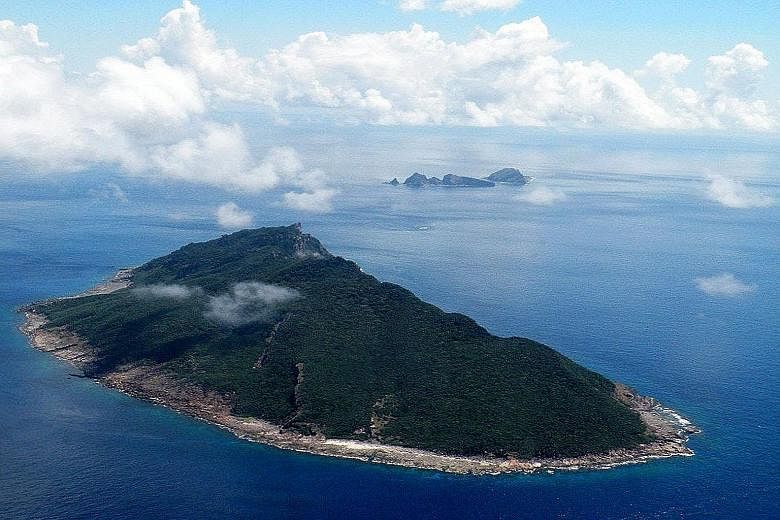TOKYO • Japan has called on China to halt construction of oil and gas exploration platforms in the East China Sea close to waters claimed by both nations, concerned that Chinese drills could tap reservoirs that extend into Japanese territory.
Japan's Defence Ministry added the demand to its annual defence review after hawkish members of the ruling Liberal Democratic Party complained that its original draft was too soft on China, a ministry official said yesterday.
China resumed exploration in the East China Sea two years ago, the report said.
In 2012, Japan's government had angered Beijing and purchased a disputed island chain there. Before then, Beijing had curtailed activities under an agreement with Japan to jointly develop undersea resources in disputed areas.
"We have confirmed that China has started construction of new ocean (exploration) platforms and we repeat our opposition to unilateral development by China and call for a halt," the Defence Ministry said.

However, Tokyo worries that the platforms will tap gas fields that overlap the median line and could also be used as radar stations or bases for drones or other aircraft to monitor air and sea activity near the disputed chain of islets, known as the Senkaku in Japan and Diaoyu in China.
The 500-page report, approved by Prime Minister Shinzo Abe's government, did not disclose details of the location or number of offshore platforms being erected by China.
China's Foreign Ministry spokesman Hua Chunying responded earlier this month when partial contents of the paper were disclosed, saying "China's relevant activities are in waters within China's jurisdiction beyond any dispute".
"The protests by Japan are groundless, and China does not accept the unreasonable request of Japan," she added.
The Japanese report also repeated Tokyo's concerns over China's growing assertiveness and widening naval reach in the Pacific and over what it calls the "opaqueness" of Beijing's sky-rocketing military budget.
But it also noted that China has worked to set up an emergency hotline with Tokyo to prevent unintended conflicts at sea.
Last week, China criticised Tokyo after the Lower House of Parliament passed Bills that could see Japanese troops fighting abroad for the first time since World War II, in provisions that allow for so-called "collective defence" - coming to the aid of allies under attack.
Millions of Chinese died in the years after Japanese forces launched a full-scale invasion of the country in 1937, and Beijing is particularly sensitive to any suggestion that Japan may abandon its pacifism.
Tokyo's move to give greater leeway to its military is far from popular at home, and polls show that approval ratings for Mr Abe - the driving force behind the changes - are plunging. A new weekend poll showed just 35 per cent of voters positively rated Mr Abe - his lowest level since coming to power in 2012.
"We hope to explain to the public that the Bills are necessary amid a harsher security environment around Japan," the government's top spokesman, Mr Yoshihide Suga, told reporters yesterday.
REUTERS, AGENCE FRANCE-PRESSE

